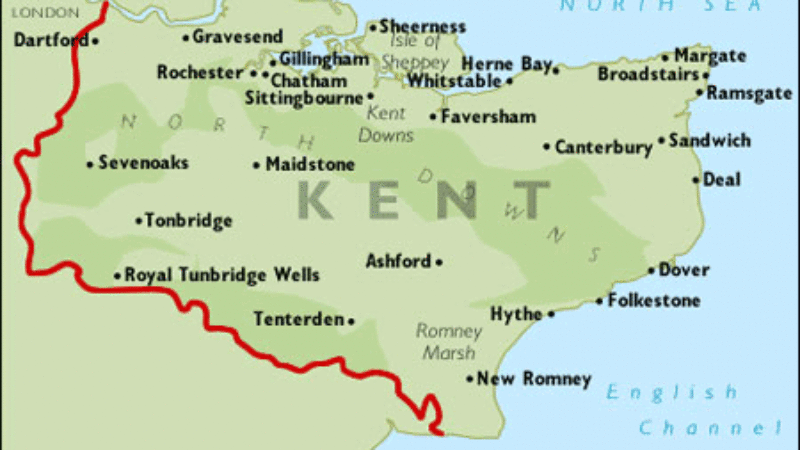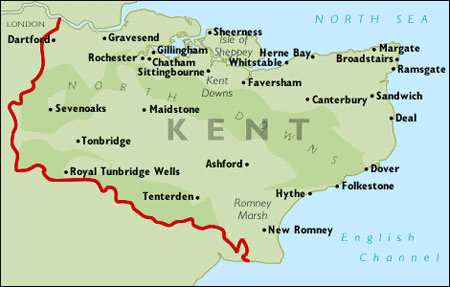
First, an explanation of why a councillor from Hackney is writing about Kent. Although I moved away when I was 18, it’s where I was born, grew up and first got involved in the Labour Party, and most of my family still live there. For the record, I’m a “Man of Kent” (people born east of the River Medway are Men or Maids of Kent, people born west of it are Kentish Men or Kentish Maids!). Those of you who follow me on twitter will know I spend a lot of weekends and my summer holidays in Margate. I love my native county and I care about it having Labour representation.
If anywhere can claim to be a bellwether county in British politics it is Kent. When Labour loses a General Election it tends to have no Kent seats (all 4 elections from 1979 to 1992, 2010). When it wins it can get 7 or 8 (each of 1997, 2001 and 2005).
Some of the individual seats are also known as bellwethers – Gravesham (formerly called Gravesend) elected an MP of the government party in every General Election from 1955 to 2005. Dartford has held the same record since 1964.
The swings here can also be high – most of the 7 seats Labour lost in Kent in 2010 ended up going from tiny Labour majorities to almost 5 figure Tory ones.
The current status of the eight Kent seats that Labour held recently is as follows:
| Seat | Con Majority |
| Dover | 5,072 |
| Chatham & Aylesford | 6,069 |
| Thanet South | 7,617 |
| Gillingham & Rainham | 8,680 |
| Gravesham | 9,312 (lost in 2005) |
| Rochester & Strood | 9,953 |
| Dartford | 10,628 |
| Sittingbourne & Sheppey | 12,383 |
These are quite big majorities but they are not necessarily entrenched ones because they appeared in just one high-swing election – all these seats except Gravesham had Labour MPs for 13 years until 2010 and their fundamental characteristics have not changed since then.
And something big has changed in Kent since 2010. Back then and for the previous three or four elections these were as near to straight two-way fights between Labour and the Tories as any set of seats in the country, with particularly low levels of Lib Dem support. Now UKIP has burst on the scene, taking 17 seats in the County Council elections in May, their largest group in the UK. Clearly UKIP will be taking some working-class votes from Labour, but the opinion polling that UKIP themselves have commissioned from Survation shows the Tories are the main victims. Their single constituency poll for Thanet South published today shows Labour’s Will Scobie winning with 35% of the vote, UKIP second with 30% and the Tories dropping to third on 28%). This could be the seat where Nigel Farage stands for Parliament. Sittingbourne & Sheppey is likely to look very similar as the county council elections there were a close three-way fight. In other Kent seats UKIP might not breakthrough quite as dramatically but could take enough votes from the Tories to give Labour a better chance than the 2010 majorities suggest.
The UKIP rise is both a tactical opportunity for Labour – we might win marginal seats because of it – and a strategic threat – we don’t want a populist rightwing party to end up with seats in the House of Commons.
Historically, if we win no seats at all in Kent we don’t win the General Election. But we don’t just win Kent seats in landslide years like 1945, 1966 and 1997. Most of these seats have been in play when we have won more modestly nationally as in 2005, 1964 and 1974.
We can’t ignore Kent because it is not a normal sized county. It’s huge. By itself Kent County Council is the largest non-metropolitan county, and larger than three of the six “Mets”, with 1.47 million inhabitants. Medway Unitary Authority adds another 264,000 people. That means Kent has a higher population that 93 of the UN’s member countries. It has 17 parliamentary constituencies – as many as Birmingham and Glasgow, the UK’s second and third largest cities, have between them. Not being ambitious about winning here means ceding any claim to be a national party with a foothold in every region.
If we are going to win in the South at all, Kent is the part of it with the biggest cluster of winnable seats

And Kent is growing in demographic and political importance. The population growth relative to the rest of the country means that with every boundary review Kent usually gets an extra seat. Labour needs to have representation in this dynamic, entrepreneurial, aspirational and very modern part of the UK.
That growth and the factors driving it are bringing with them demographic and political changes which improve Labour’s chances. As London becomes more expensive to live in, Labour-voting Londoners, including members of BAME communities, are moving to commute from North Kent. HS1, whilst very expensive, has brought high-speed travel to the entire Kent coast making the whole area commutable. Arts-led regeneration of run-down seaside towns like Folkestone with its triennial festival and Margate with the Turner Contemporary Gallery is bringing in the types of residents more usually expected in Islington. Whitstable, which was a sleepy former fishing port when I started going to CLP meetings there in the 1980s, is now full of “DFLs” (Down From Londons), many of whom are moving there. The presence of the University of Kent has helped transform my home town, Canterbury, from a bastion of small “c” conservatism into a seat Labour nearly won in 2001 when Emily Thornberry fought it.
There are issues aplenty that Kent voters need to hear policy solutions to from Labour. Despite the regeneration efforts, there are pockets of intense deprivation in the seaside towns. Public services are not great, and voters resent the perception that London has received more investment in services than they have. For instance, the police are spread very thin in rural parts of the county; there is now no A&E department between Margate’s QEQM Hospital and the William Harvey in Ashford nearly 25 miles away; the retention of the 11+ grammar/secondary system means the vast majority of Kent school children are labelled as failures at 11 and go to re-branded secondary modern schools, with OFSTED also branding Kent and Medway schools as among the worst in the country at primary level. Whilst HS1 has brought high-speed Javelin trains, a season ticket from Thanet to London is the most expensive commuter-distance fare in the UK.
There are political reasons why UKIP is popular here too, which Labour needs to have a clear position on. Although it is never going to win a bidding war against UKIP for populism Labour needs to show Kent voters it takes these issues seriously. Immigration is a huge issue because Dover is the main sea port of entry to the UK so some migrants don’t go a lot further; because under-occupied B&Bs in the seaside towns are turned over to hostel accommodation; and because agri-businesses like the Thanet Earth mega-greenhouses and Kent’s remaining iconic orchards employ migrant labour. Europe is primarily an issue because migration is seen as being a consequence of EU rules. The Tories’ bluster on both these issues has now been exposed – they used harsh rhetoric in opposition but haven’t done much in government. Immigration is not a show-stopper for us in Kent – we won 8 of the seats in 2001 despite it being ground zero in the then “asylum seeker crisis”, and 7 in 2005 with local MP Michael Howard being the Tory Leader and running with the vile “are you thinking what we’re thinking” dog-whistle campaign.
Labour has made a good start at a fightback in Kent by selecting excellent candidates in all the previously Labour held seats, all of whom are campaigning hard. For instance, my friend Guy Nicholson has been campaigning in Sittingbourne & Sheppey more or less since 2010. However, we have lost the incumbency advantage of the previous MPs, of whom only Paul Clark in Gillingham & Rainham is re-standing. Of course, Laura Sandys’ announcement she is quitting in Thanet South means the Tories get no incumbency benefit there either. Our other weakness is that although there are plenty of voters in Kent who will pick Labour in a good year, and an underlying core vote based on deep cultural roots (Labour MPs and councillors in some areas as early as the 1920s, pockets of trade unionism such as the steelworks on Sheppey, the old East Kent coalfield, and the port of Dover), the CLP memberships are not huge because the main demographic that actually joins Labour, Guardian readers, are rather sparse in Kent.
But given the UKIP effect I think we are being a little bit over-pessimistic in only including two of these eight seats in our 106 target marginals. If the other six end up back in play, some as three-way marginals, because of UKIP, a small amount of central resourcing such as calls from the national phonebank, or a part-share in a professional organiser could make all the difference. Maybe there are some donors out there who might read this and make a hypothecated donation to Labour to help fund the campaign in these seats. Making more of an effort here isn’t just organisational or about resource though – it’s political. It’s about Ed and the rest of the Shadow Cabinet visiting these seats, talking with Kent voters and about Kent, and making policy announcements about the local and national issues voters there care about.
On a night of 1st May 1997 my pride in Labour’s historic victory was even greater because my home county returned eight Labour MPs. I want to see that happen again and I believe that in a tight General Election adding a potential eight to our tally, i.e. 16 to our majority, is too big a prize not to aim for.




More from LabourList
New Labour peers announced including former Downing Street comms chief
‘Labour’s women’s conference compromise raises questions about our commitment to single-sex spaces’
‘Banning trans women from women’s conference is a blow to trans people’s participation’